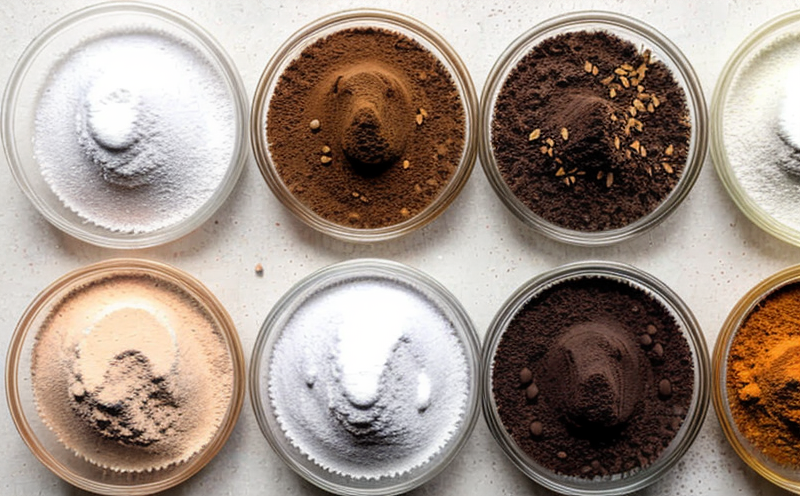AOAC 2010.09 Carmine Residue Testing in Dairy Products
The AOAC International Standard Method 2010.09 is a widely recognized technique for detecting the presence of carmine, also known as cochineal extract, in dairy products. Carmines are natural colorants derived from the dried bodies of the cochineal insect and have been used historically to impart red or pink hues to foods.
Compliance with this test is essential for food manufacturers who use carmine as a coloring agent. The method measures residual levels of carmine in dairy products, which are often processed to ensure that they meet regulatory standards set by governing bodies such as the FDA and EU regulations.
The AOAC 2010.09 involves several steps, starting with sample preparation where the dairy product is homogenized and then filtered through a fine mesh filter. The filtrate undergoes colorimetric analysis using spectrophotometry to measure absorbance at specific wavelengths corresponding to carmine's characteristic chromophores.
For accurate results, it’s critical that samples are prepared in strict accordance with the AOAC protocol. This includes ensuring proper dilution ratios and maintaining consistent temperature conditions during the measurement phase. The method is sensitive enough to detect even trace amounts of carmine, making it invaluable for quality assurance programs aimed at preventing contamination or unauthorized use.
The significance of this test extends beyond mere compliance; it plays a crucial role in maintaining consumer trust by ensuring transparency regarding ingredient sourcing and processing methods. By adhering strictly to the AOAC 2010.09 protocol, manufacturers can demonstrate their commitment to high-quality products free from unintended additives or contaminants.
Understanding the broader context of dairy product quality control is important here. Dairy products are subjected to rigorous testing not just for colorants but also for various other parameters like fat content, protein levels, and microbial safety. The AOAC 2010.09 test fits into this comprehensive framework by focusing specifically on carmine residues.
In summary, implementing the AOAC 2010.09 procedure ensures that dairy products contain only approved natural colors, thereby upholding standards of purity and authenticity crucial for both regulatory adherence and brand integrity.
Eurolab Advantages
EuroLab prides itself on offering top-tier services in food & feed testing, leveraging advanced technology and experienced personnel. Our state-of-the-art facilities ensure precision and reliability in every test conducted.
- Comprehensive Testing Capabilities: We provide a full range of analyses tailored to meet the specific needs of our clients across various sectors including dairy, meat, grains, and more.
- Regulatory Compliance Expertise: Our team keeps abreast of all relevant international standards like ISO, ASTM, EN, IEC, etc., ensuring that every test conducted aligns with current regulations.
We employ cutting-edge instruments such as high-performance liquid chromatography (HPLC) and gas chromatography-mass spectrometry (GC-MS), which are instrumental in delivering accurate results. Our commitment to excellence is further underscored by our ISO 17025 accreditation, affirming our capability to deliver robust data.
Our clients benefit from personalized service where we work closely with them to understand their unique challenges and provide tailored solutions. This approach ensures that each test not only meets but exceeds expectations in terms of accuracy and efficiency.
Why Choose This Test
- Ensures Compliance: Adherence to the AOAC 2010.09 standard is crucial for meeting regulatory requirements set by bodies such as the FDA and EU, thus avoiding potential legal issues.
- Promotes Consumer Trust: By ensuring that carmine residues are within acceptable limits, manufacturers can enhance their reputation and foster consumer confidence in their products.
The AOAC test is not only beneficial for regulatory compliance but also serves as a key tool in maintaining product quality. It helps identify any discrepancies early on, allowing for corrective actions to be taken promptly. This proactive approach prevents costly mistakes down the line and ensures consistent product quality across all batches.
Moreover, the test fosters transparency within the supply chain by providing clear evidence of adherence to standards. This is particularly important in industries where trust plays a significant role, such as dairy production. Consumers are increasingly demanding transparency about what goes into their food, making tests like these essential for building and maintaining brand loyalty.
By choosing this test, manufacturers demonstrate their commitment to producing safe, high-quality products that meet both legal requirements and consumer expectations. This aligns with broader industry trends towards greater accountability and sustainability practices.
Quality and Reliability Assurance
EuroLab is dedicated to maintaining the highest standards of quality assurance in all its operations. Our robust Quality Management System (QMS) is based on ISO 17025, ensuring that every aspect of our testing process adheres strictly to internationally recognized best practices.
- Strict Adherence to Standards: All tests are conducted according to the latest international standards including AOAC and other relevant regulatory guidelines. This guarantees accuracy and reliability in all results produced.
- Data Accuracy and Transparency: Our comprehensive records and transparent reporting ensure that clients have access to detailed, accurate information about their samples at any time.
We invest heavily in continuous training for our staff to stay updated with the latest developments in analytical techniques. This commitment to ongoing education ensures that our experts remain at the forefront of technological advancements within the field of food & feed testing.
Our quality assurance protocols extend beyond just the execution of tests; they encompass every stage from initial sample receipt through final analysis and reporting. This holistic approach guarantees not only precise results but also peace of mind for our clients knowing that their samples are handled with utmost care and attention to detail.





